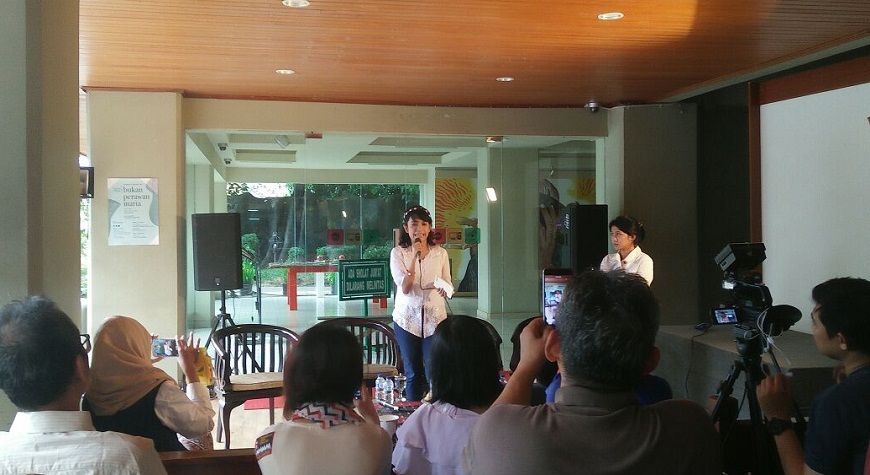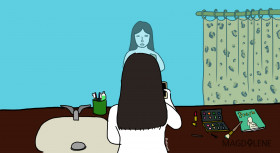In a time when posting anything critical about religion on social media can land you in jail, author Feby Indirani released a collection of short stories that pretty much pokes fun at Islamic belief and its believers.
The 19 stories in Bukan Perawan Maria, published by Pabrikultur, ask readers one thing: to lighten up, because, it’s only religion. It reflects her take on the increasingly more conservative society, and her belief in literature as to tool to ease the seemingly growing pain.
“When I wrote an opinion piece, people got quickly triggered. Its headline alone could trigger thoughtless response,” she said at the book launch on July 15.
“But from my experience publishing fictions, I find that people are more considerate, even if they still don’t agree with it. So I believe fiction could be the bridge that we need at the moment. It could be an alternative route to approach todays problems,” said Feby.
Before the book was released, she tested the water by publishing some of her short fiction in the local media, she said. One of them, Bukan Perawan Maria, which became the collection’s title, was published on Magdalene.
“I believe there’s still hope to change the situation by using stories as medium,” she added.
Also speaking at the book launch were social activist Inayah Wahid and screenwriter and film director Salman Aristo. Inayah said it reading the religious satire in present-day Indonesia gave her a thrill of horror, as the book questions and criticizes the way religion is practiced these days.
“We live in an era when saying ‘ndeso’ (provincial) may put you in jail and a slip of tongue can end up in a bloodbath. People nowadays have forgotten how to joke around harmlessly,” said Inayah, whose father the late former president Abdurrahman Wahid was one of the most influential Muslim leaders in Indonesia and was known as a champion of pluralism.
Inayah told the audience how most Muslim clerics in smaller districts had been using humor to get their messages passed and how it had been an effective tool to build intimacy and warmth with the audience.
“But, now, knowing that we can’t joke about things, we can’t even talk about things freely, I wonder, how will we grow?,” asked Inayah.
“My father, Gus Dur, once told me that censorship isn’t exactly what people need. He said, ‘The government needs to empower the people, not dictate them over what they should or should not consume. Once the people are capable of thinking critically, they would do their own censorship. They would know what deserves their attention and what doesn’t’,” she told.
Salman Aristo said that the book makes him feel nostalgic: “Lot of the stories reminded me of my childhood, back when I was raised in a very Islamic family.”
“One of these stories centers on a person who wants to kill a muezzin (the man who calls for prayers or azan), because his horrible voice reminds him of the Umar Bin Khattab story. Umar was known an enemy of Islam, but one day he heard a muezzin calling out the azan and was so astonished by how beautiful it sounded that he eventually decided to convert to Islam to learn more. Now, imagine what Umar would have done if he heard what we hear these days? Hoarse-sounding muezzin screeching to wake everyone in the neighborhood up in early morning, or children giggling while calling out the azan on the loudspeaker. Well, Umar might have killed the Prophet and his entire followers,” he told playfully.
Salman also said that the book reminds him of how inclusivity is supposed to be something that comes naturally to believers, but not anymore.
“One time, when I was filming at Gontor Pesantren (Islamic boarding school), I asked a kyai (religious leader), ‘Why are religious people so angry these days?’ He answered playfully, ‘I guess they have just learned a chapter about anger. They should’ve continued and learn a lot more’,” Salman recalled.
“I still believe openness should come organically,” he added.
The author also initiated the movement “Relax, It’s Just Religion”, which is currently holding an art exhibition at Galeri Cipta III, Taman Ismail Marzuki. Opened on the day of the book launch on July 15, the exhibition will end on July 25.
Curated by Hikmat Darmawan, the artworks being shown at the exhibition adapt from Feby’s short stories. Each story was turned into paintings, comics, installation arts, videos, and more. There are several artists involved in the process, but not all of them revealed their identities because of the sensitive nature of the theme.
One of the artworks is a drawing of a guy with a big hole in his body and with his organs falling out, staring at an empty hallway. The drawing was based on the story “Ruang Tunggu” (The Waiting Room), representing the afterlife of a suicide bomber. Instead of being in heaven surrounded by angels as has been promised for his sacrifice, he is stuck in the waiting room.
Another one is a comic based the story “Baby Ingin Masuk Islam” (Baby Wants to Convert to Islam). A female pig named Baby wants to convert to Islam after watching people praying every day. A pig is considered “haram” or forbidden in Islam, so it causes a big fuss in the neighborhood, where the debate centers on whether or not to allow the conversion to take place.
One of the videos shows a collection of pictures on things that read “Allah” in Arabic script, whether it’s on beehive, watermelon, trees, eggs, and other things. It is a nod to the story “Lafadz 411 Pada... Saya Tak Tega Menyebutnya” (On 411 Pronouncement... I Don’t Have the Heart to Say It), in which something that resembles the word “Allah” is found in human feces.
Order the book here and follow relaksasi beragama on Instagram for update. Also, read our exclusive interview with Feby Indirani about the book.
Read Ayunda’s piece on her visit to an old Chinese community in Tangerang.









Comments